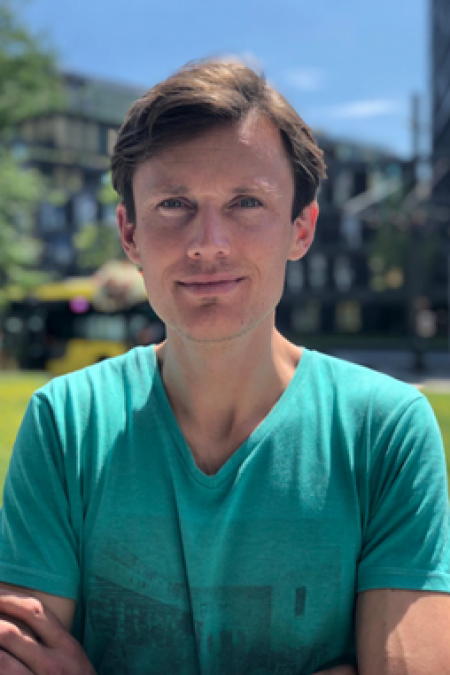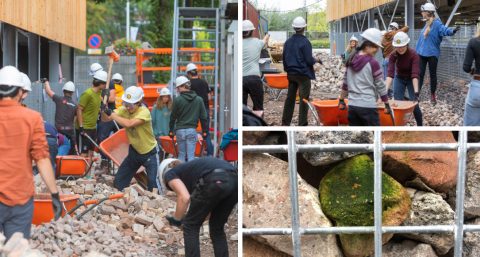The campus as a living laboratory
Students and researchers experiment for sustainable development
Research at Utrecht University not only takes place in laboratories. The campus itself is teeming with living labs in which researchers and students work together in an entrepreneurial way, on experiments concerning sustainable development. UULabs facilitates these living labs. Project manager Mark Kauw tells us about them.
After parking and exercising at Olympos, you walk to Denver House on the Bolognalaan. On the way, you get a tomato burger in the Educatorium. Unnoticed, you are involved in five ongoing research projects in living labs in the Utrecht Science Park...

What is UULabs?
Utrecht University's Strategic Plan 2025 states that the campus is a testing ground for experiments on sustainable development, in line with the Sustainable Development Goals and the university's own sustainability ambitions in the areas of climate, biodiversity and circularity.
That's nice, but if you don't actually do something and work on it in a focused way, I don't think much will have been done by the end of 2025. That is why UULabs was set up, a dedicated team to make the living labs possible on a daily basis. These living labs involve students and staff, both researchers and support staff. We help create ideas, set up new living labs and bring the right people to the table.
Living labs?
A living lab is literally a living laboratory: a living workplace, in our case on our own campus for education, research and business. They are experiments in which researchers, students and social partners together devise solutions for sustainable challenges.
By campus, do you mean the Utrecht Science Park?
No, including the city centre and other university buildings. It is about the campus in the abstract: everything that has to do with the university organisation. UULabs aims for as many active labs as possible wherever the university is active. Preferably visible, but sometimes a lab is not visible in the sense of tangible.
There are also virtual labs, for example for a student who wants to carry out a nudging surveillance experiment for her thesis, focusing on the plant-based offerings in our caterer's canteens and cafés. Suppose she compares the espresso bar in the University Library on the Drift with the one in the Utrecht Science Park and then makes two different interventions. This is not necessarily very visible, but she uses the population, real people. People's behaviour, movement or opinion can also be the subject of a lab.
Ultimately, from a research perspective, it is all about data. Everything that produces interesting research data is potentially a living lab.
How does a living lab come about?
That differs. The living lab at the Olympos car park came about through a good collaboration between a lecturer in Bio-Inspired Innovation and a real estate project leader. A competition about the debris that was created during the renovation of the Dom tower gave an extra push. You could literally win debris from the Dom tower if you had a good idea for doing something with it. We used it for a wall around the car park, in those metal cages with stones in them (gabions). A group of students helped fill the cages for an afternoon, in exchange for a cold drink afterwards.

In the living lab, a group of students will measure how bio-receptive the material in the gabions is. They are different kinds of stones, which mosses and plants can grow on them? The students study Bio-Inspired Innovation and Medicine. The medical students are taking a course on nature-based medicine design.
When can someone with a good idea come to UULabs?
Always! Students, researchers, staff, partners and lecturers are essential to the success of the living labs. UULabs is there for the start-up phase. We can help you start a living lab, or see which existing lab you can join.
Or just drop by. We regularly organise crash courses and excursions to inspiring examples to help staff and students get started in living labs.
Note: As of 1 September 2022, Mark Kauw no longer works at the UU. For UULabs, please contact Tom McDevitt (Living Lab Coordinator, t.c.mcdevitt@uu.nl) or Lysanne van der Lem (Programme Manager Sustainability, l.vanderlem@uu.nl).
About this series
As university, we want to make our knowledge available to society and offer solutions,
says Anton Pijpers, president of the Executive Board. Contributing to society can be done in many ways and our campus should allow for this. We encourage our students and colleagues to be entrepreneurial: take initiative! Don't wait around for someone else to take action.
In this interview series, the Centre for Entrepreneurship introduces you to the people who can help take your idea further, or make that possible. In the section named "See also" you will find the other articles in this series.

